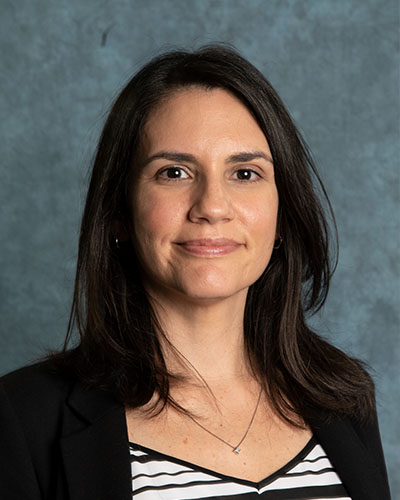Cindy Ermus, Ph.D.
Director of Medical Humanities, Associate Professor, History

Bio
Summer 2024 Office Hours: N/A.
Cindy Ermus, Director of Medical Humanities and Associate Professor of History, teaches courses on European history, the Age of Revolutions, and the history of disasters. She specializes in the history of medicine and the environment, especially catastrophe and public health crisis management, in eighteenth-century France and the Atlantic World. She has also published on digital history and the future of the historical profession. Her work has been featured in The Washington Post, The Atlantic, Stat News, The Miami Herald, and El Nuevo Herald, and she has been a guest on BBC World News, Univision, Al-Jazeera, and others.
Her book, The Great Plague Scare of 1720: Disaster and Diplomacy in the Eighteenth-Century Atlantic World (Cambridge University Press, 2023), is a transnational study of the Plague of Provence of 1720 (or Great Plague of Marseille), one of the last outbreaks of plague in Western Europe. By tracing responses to the threat of infection throughout a network of major eighteenth-century port cities, she explores the ways in which the crisis influenced society, politics, and commerce beyond France in neighboring regions and in the Atlantic colonies.
Her second, shorter monograph is an introductory history on Urban Disasters that will appear in the Cambridge Elements series on Global Urban History (2023). An exploration of the history of urban disasters around the globe over the last three hundred years, it introduces the reader to central concepts that help define the study of disasters and examines the relationship between cities and disasters including earthquakes, hurricanes, fires, and epidemics. The book concludes with a brief look at the ongoing effects of climate change and the future of cities.
She is also the editor of a volume on disaster and risk in the Gulf South that was published in January 2018 (LSU Press). Beyond her research and the classroom, she is Series Editor for France Overseas: Studies in Empire and Decolonization with the University of Nebraska Press, as well as co-founder and co-executive editor for the digital, open-access, peer-reviewed publication www.AgeofRevolutions.com, which explores themes and moments in the history of revolutions.
Research Interests
- 18th-Century France & Atlantic World
- Age of Revolutions
- History of Science, Medicine, and the Environment
Publications
- The Great Plague Scare of 1720: Disaster and Diplomacy in the Eighteenth-Century Atlantic World. Cambridge University Press, 2023.
- Urban Disasters. Cambridge Elements series in Global Urban History, Cambridge University Press, forthcoming 2023.
- Environmental Disaster in the Gulf South: Two Centuries of Catastrophe, Risk, and Resilience. Baton Rouge: LSU Press, 2018.
- “Spanish Foundations of the French Quarter: Rebuilding Colonial New Orleans in the Wake of Disaster,” in Port Cities of the Atlantic World: Sea-Facing Histories of the US South, edited by Jacob Steere-Williams and Blake Scott. Columbia: University of South Carolina Press, forthcoming Fall 2023.
- “Digital Humanities for the People(?): Past, Present, and Future,” Historical Reflections/Réflexions Historiques, forthcoming Winter 2023.
- “Managing Disaster and Understanding Disease in the Early Eighteenth Century,” Pre-Modern Environment & Disease, edited by Lori Jones. London: Routledge, 2022.
- “Memory and the Representation of Public Health Crises: Remembering the Plague of Provence in the Tricentennial.” Environmental History 26, no. 4 (October 2021): 776-88.
- “The History of Science and the Science of History: Computational Methods, Algorithms, and the Future of the Field,” with Abraham H. Gibson. Isis 110, no. 3 (September 2019): 555-66.
- “Swamp Things: Invasive Species as Environmental Disaster in the Gulf South,” with Abraham H. Gibson. In Environmental Disaster in the Gulf South: Two Centuries of Catastrophe, Risk, and Resilience, edited by Cindy Ermus. Baton Rouge: LSU Press, 2018.
- “The Spanish Plague That Never Was: Crisis and Exploitation in Cádiz During the Peste of Provence.” Special issue on Humans and the Environment in the Long Eighteenth Century, Eighteenth-Century Studies 49, no. 2 (January 2016): 167-93.
- “The Plague of Provence: Early Advances in the Centralization of Crisis Management.”
Arcadia: Environment & Society, no. 9 (2015). - “Plague Cultures: The Peste of Provence and the Glorious Revolution.” Age of Revolutions.
December 2015. - “Reduced to Ashes: The Good Friday Fire of 1788 in Spanish Colonial New Orleans.” Louisiana History: The Journal of the Louisiana Historical Association LIV, no. 3 (Summer 2013): 292-331.
- “Why are there fewer kings and queens today?,” Britannica [Kids] Magazine (October 2022).
- “When bubonic plague hit France in 1720, officials dithered. Sound familiar?” Stat News (May 25, 2020). Also published as: “La peste bubonique a frappé la France en 1720. Les fonctionnaires ont hésité. Semble familier?,” Fr24 (May 25, 2020); and in English: “The bubonic plague struck France in 1720. The officials hesitated. Seems familiar?,” Fr24 News (May 25, 2020).
- “The danger of prioritizing politics and economics during the coronavirus outbreak: Three hundred years later, the lessons of the Great Plague of Provence are sounding an alarm,” The Washington Post (March 13, 2020).
- “The Cuban Revolution and Me” (cover story), In Cuba Today (July 5, 2016). (Also on www.AgeofRevolutions.com).
- “What does it mean to be ‘a product of the Cuban Revolution?’” The Miami Herald (July 25, 2016). Published in Spanish: “¿Qué significa ser ‘un producto de la revolución cubana?’” El Nuevo Herald & En Cuba Hoy (July 25, 2016).


